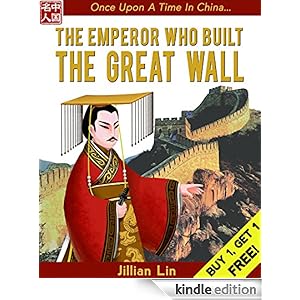Well, Chinese New Year is suddenly upon us, faster than I realized.
I wanted to include the holiday as part of our homeschool studies, but wasn't on top of things the past couple weeks, and now here we are, the new year almost upon us, and I'm scrambling to pull something together.
I stopped by the library today to see if I could pick up some books, but there was only 1 book left about Chinese New Year! (This is what happens when I wait until the last minute to get materials!) Thank God for the internet, though!
So, on super short notice, this is what I came up with, covering social studies, math, science, cooking, foreign language and art.
- Discovering China - Chinese New Year Video:
- The Emperor Who Built the Great Wall - e-Book by Jillian Lin(mention in my previous post), that tells the history of the first Emporor of China (and how China got its name). Available on Amazon for $2.99, but for the first 2 days of the new lunar new year, February 19-20, it will be free!
- Western and Chinese New Year's Celebrations - This was the only book left at the local library about Chinese New Year. It's got way more than Chinese New Year, but we'll read the parts that are relevant, and maybe also inspired to find out how other cultures celebrate their new years.
- Symbolism of traditional Chinese New Year foods - Great summary of traditional food items eaten for Chinese New Year celebrations.
- Homemade dumplings (this is a basic pork filling, but uses pre-made wrappers), with homemade wrappers with my dad's dough recipe. We'll tie in math here, probably making a 2/3 or 1/2 portion of this recipe:
6 cups flour
2 ½ cups
water
½ tsp salt
Mix, let
sit, knead some more. Using a Kitchen-Aid mixer with dough hook makes this super easy!
Here's a video that includes how to make the dough.
- Chinese zodiac animals video - Overview of Chinese beliefs about the zodiac.
- Draw Chinese zodiac animals - Cute Step-by-Step printouts for art and foreign language, I'll have the kids label them with the Chinese words for each animal.
- Chinese lunisolar calendar video - Cartoon that talks about lunar and solar calendars that the Chinese use, this is a brief overview.
- Chinese calendar - This is a more in-depth description of the Chinese lunisolar calendar, but alot of this will be too complex. To incorporate science, I'll focus on the orbit of the moon, the solstices and equinoxes, and tilt of the earth in relation to seasons.











